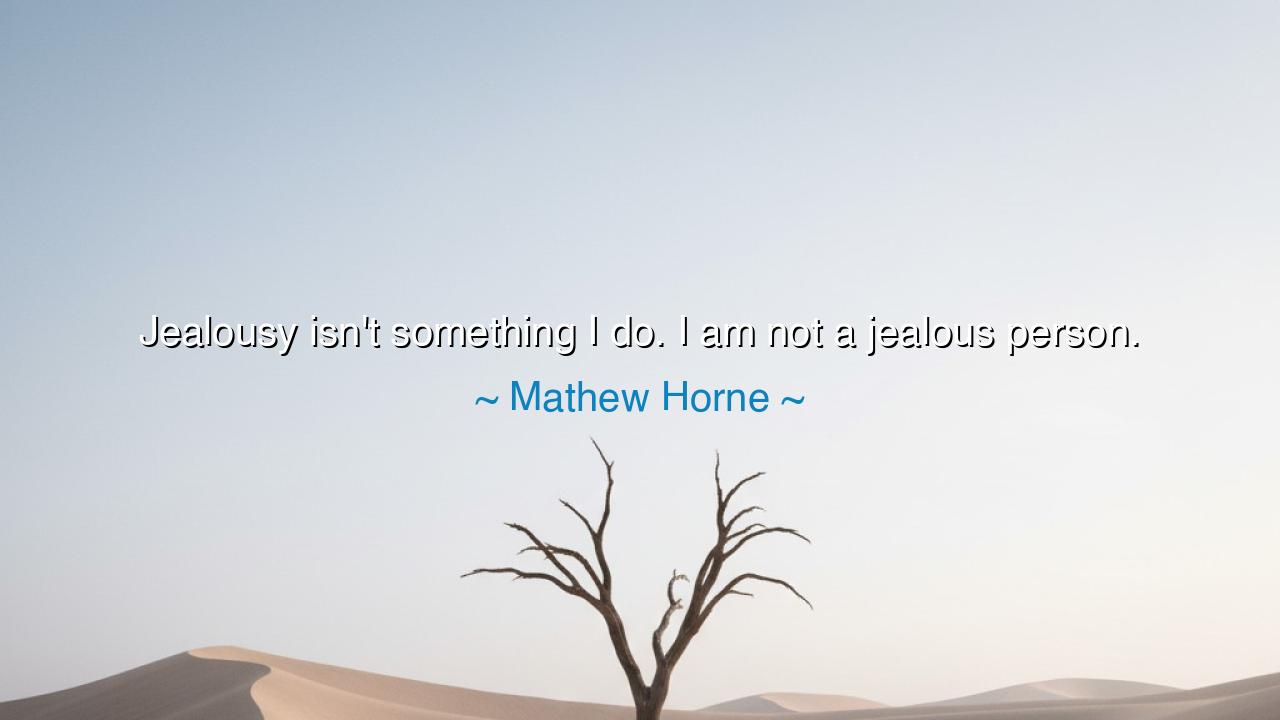
Jealousy isn't something I do. I am not a jealous person.






There is a quiet confidence, almost a serene dignity, in the words of Mathew Horne, when he said: “Jealousy isn’t something I do. I am not a jealous person.” These words are not the boast of a man without feeling, but the calm declaration of one who has mastered his emotions. In a world where jealousy often poisons relationships, corrodes trust, and blinds love, Horne’s statement stands as a testament to self-knowledge and emotional discipline. It speaks to the art of living with inner peace — of knowing one’s own worth so deeply that comparison holds no power.
To say “I am not a jealous person” is to proclaim victory over one of the oldest and most destructive human impulses. Jealousy is born from fear — the fear of loss, of inadequacy, of being unseen or unloved. It arises when the heart measures its worth against another and finds itself wanting. But Horne’s words suggest a different kind of strength: the strength of one who no longer competes for validation, because he has already found peace within. Such freedom does not come by nature; it is the fruit of self-awareness, trust, and humility — qualities that must be cultivated like a patient gardener tending his soul.
The ancients spoke of this virtue often. The Stoic philosopher Epictetus taught that no man can steal another’s peace unless we allow it. He said, “It is not the things themselves that trouble us, but our opinions about them.” In the same way, jealousy is not caused by the success or affection of others, but by the shadowed thoughts we project upon them. To live without jealousy is to see life as abundant rather than scarce — to believe that love, success, and happiness are not treasures to be hoarded, but blessings that multiply when shared. Mathew Horne, whether consciously or not, speaks from this Stoic wisdom: he does not do jealousy because he does not feed the illusion of competition that sustains it.
History gives us powerful examples of those who rose above envy. Consider Nelson Mandela, imprisoned for twenty-seven years, yet emerging without bitterness toward those who wronged him. A lesser man might have been consumed by jealousy for the power and freedom of others. But Mandela’s greatness lay in his refusal to let resentment define him. His soul, anchored in purpose, could not be moved by comparison. This is the same inner stillness Horne’s words evoke — a refusal to allow jealousy to dictate one’s character or actions.
To live without jealousy does not mean one is without desire or passion. It means that one’s desires are tempered by trust — trust in oneself, in others, and in the flow of life. When a person is secure in their identity, they no longer see another’s light as a threat, but as part of the same divine fire. They no longer cling to love with fear but hold it with gratitude. Such a person walks through life not grasping, but giving — and in that generosity, they find peace. This is the hidden power behind Horne’s simplicity: a declaration of inner mastery disguised as modest speech.
But let us not mistake calmness for indifference. To be “not jealous” is not to be cold or unfeeling; it is to love without chains. It is to trust those we care for enough to grant them freedom, knowing that love born of liberty endures far longer than love born of fear. The jealous person seeks to possess; the wise person seeks to understand. The jealous heart says, “You are mine”; the wise heart says, “You are free, and I am at peace.”
So let this be the lesson for those who hear these words: if jealousy torments you, do not fight it by force, but by understanding. Ask yourself what wound it protects — what fear lies beneath its whisper. Then tend that wound with truth and compassion, and slowly, jealousy will fade, replaced by calm certainty. Build your worth not upon comparison, but upon your quiet integrity. For as Mathew Horne reminds us, peace is not given — it is chosen, each day, by those who refuse to let envy rule their hearts.
Thus, when he says, “Jealousy isn’t something I do,” he offers not arrogance, but a model for freedom. His words are a gentle challenge to us all: to rise above the need to measure ourselves by others, to find joy in another’s joy, and to love without fear. For the one who has conquered jealousy has already conquered the self — and that is the highest victory a human being can achieve.






AAdministratorAdministrator
Welcome, honored guests. Please leave a comment, we will respond soon